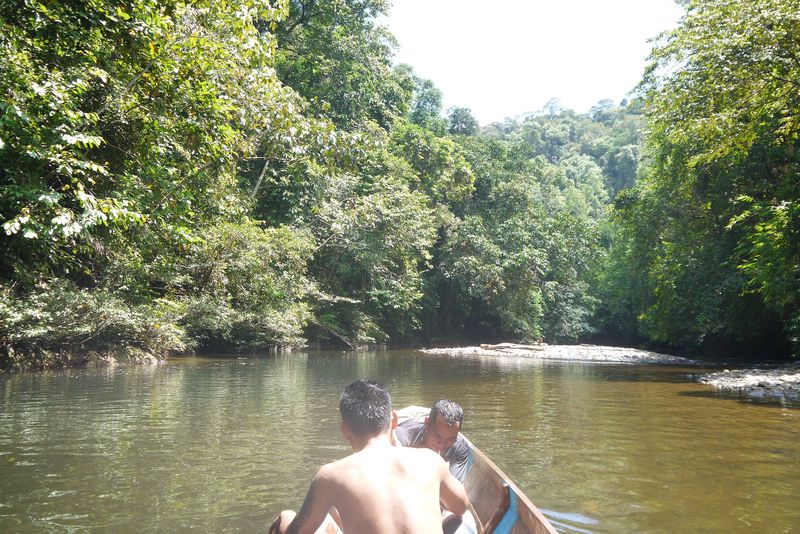
20 Aug Our Journey into the Jungles of Borneo
A bat crash-landed on our bed.
I say bed, but it was really just a piece of tarpaulin laid out on the floor of our camp, deep in the jungles of Borneo. Perhaps the bat was confused by the light from our candles flickering feebly in the night breeze, no match for the deep darkness that lay thick around us. While Andrew and I leapt up in shock, the dazed bat pulled itself along on spiky elbows, its leathery wings stretching and contracting as our local guide, Ganya, herded it away from our camp.
We settled down to try to sleep again but the noises of the jungle; crickets and birds, the rustling of leaves and the constant rumble of the river next to us kept us awake long into the night. As I lay on the hard, cold floor I felt further away from home, and myself, than ever before. Our two day trip into the jungle had become a true journey into the unknown – one I’ll never forget.
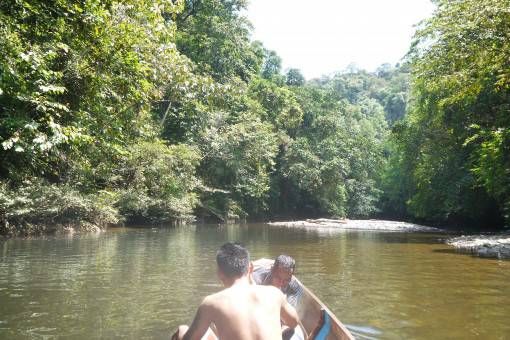
Touchdown in Malaysia
We arrived in Malaysia with one goal: to see orangutans in the wild, not an easy task given the scale of deforestation in Borneo. After only one night in Kuala Lumpur we flew straight to Kuching to begin our quest, which would take us to Batang Ai National Park, the only place in Sarawak to see wild orangutans. While you can pay around £180 per person to go out there with a tour company and stay in a traditional Iban longhouse we were determined, against the advice of everyone we met, to make the journey independently – however tough it may be.
And it turned out to be pretty tough.
Stepping off the Beaten Track into the Jungles of Borneo
The first leg of our journey was a three-hour bus trip to the small town of Sri Aman. We were the only tourists there and as we walked the streets looking for somewhere to stay the locals waved and shouted greetings, some covertly taking pictures of us as we passed. At the bus station we met a smiley English-speaking woman, Shen Chem, who was baffled to hear that we wanted to visit Batang Ai:
“No-one goes there anymore – there aren’t any buses,” she explained.
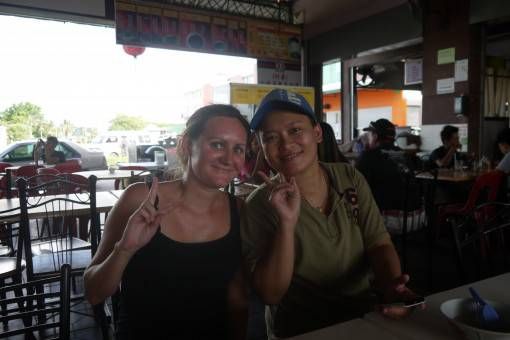
Me and Shen Chem
Once Shen saw that we were determined to get there, however, she called her father who agreed to drive us to the harbour in Lubok Antu the next day. From there we could hire a boat to take us over the Batang Ai reservoir and up the river to the National Park.
That’s when we took a wrong turn.
We’d read some sketchy information on the internet which said you could get a boat from the harbour to one of the local Iban Longhouses, where you could stay for a small fee. So, we boarded the lone boat in the harbour only to find that we were headed straight for the only tourist accommodation along the whole river: the swanky Batang Ai Hilton resort, which was way out of our price range.
When we disembarked we were herded into the hotel; once they realised that we had no intention of staying the staff weren’t happy that we’d taken advantage of their free shuttle boat. We tried to explain that we wanted to get to the National Park but were met with bemused silence and shakes of the head:
“There’s nowhere to stay at the National Park,” the woman explained, losing patience.

Determined to carry out our plan of finding a longhouse to stay in at the National Park we eventually persuaded the Hilton staff to let us hire a longboat. The driver Luong, a tiny Iban man in his sixties with a deeply creased face warned us that the National Park headquarters were closed for the day and we wouldn’t find accommodation there. Nevertheless, we stubbornly insisted he take us there.
As we boarded the narrow longboat it swayed dangerously beneath us before the motor started and we sped through the topaz water, green jungle zipping by on either side. The sun was high and strong, the sky and clouds above reflecting perfectly off the water’s surface. At times we had to slow to avoid the limb-like sticks poking up from the water; there was also a scary moment when we hit a rock and I felt we were certain to capsize along with all our worldly possessions.
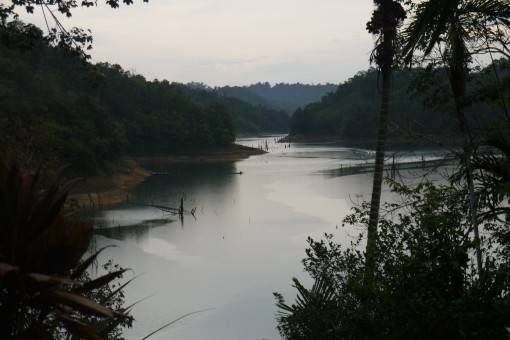
After an hour we arrived at the headquarters and sure enough, as Luong and everyone else had warned us, it was closed. We were stuck and completely unsure of what to do next. Just as it looked like we were doomed to spend the night at the Hilton, Luong announced that he’d take us to stay at his extended family’s longhouse; they could help us get to the National Park the next day.
When we arrived at the foot of the longhouse we were greeted by countless roosters, chickens and a pack of skittish puppies. As we followed Luong up the wooden steps to the entrance of the longhouse I felt anxiety rising in my throat – we were walking unannounced into a family home expecting a bed for the night, would we simply be turned away?
Our Night in the Batang Ai Longhouse
We paused hesitantly at the threshold of the longhouse feeling like total intruders. Luong walked ahead into the open communal living space which runs the entire length of the longhouse; on the left side doors led off to separate sleeping quarters. Skinny dogs lay all around; a group of women with toddlers and babies sat on straw mats on the floor laughing and talking while old women dressed in long sarongs and men in shorts sat alone or in pairs.
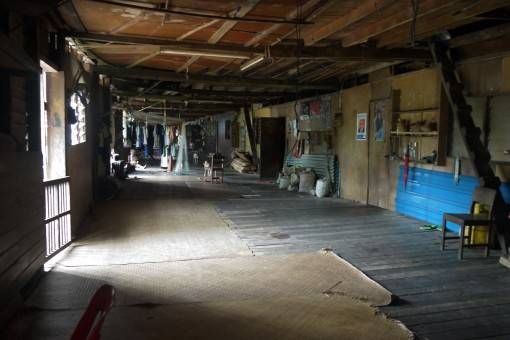
When they noticed our arrival some of the Iban people rushed to greet us; an old man offered his hand and a warm, almost toothless smile while some of the young women waved and babies gazed at us with wide dark eyes. Luong took us directly to the Chief; a quiet statuesque man. Despite his serene nature and tendency to listen rather than speak, we quickly noticed that the Chief commanded a gentle but firm authority over the daily running of the longhouse and was deeply respected by the other residents.
To our surprise and immense relief the Chief accepted our impromptu arrival without question and invited us to stay the night, assuring us that he’d find someone to take us to the National Park the next day. The Chief and his wife made tea and we sat on the floor to talk and Luong grew animated as he told us stories about the Iban people, their traditions and lifestyles.
“When the Japanese came in the war,” he told us, sitting cross legged on the floor, his cigarette spiralling smoke as he spoke, “The Iban people hid in the jungle and watched the Japanese shoot the villagers with their guns.” Luong paused to mime firing an invisible machine gun, his eyes fierce and bulging.
“Then, when they finished, the Ibans came running out of the jungle and: SWISH,” Luong swiped a hand viscously through the air; “They chopped off their heads and hung them up in the longhouse as a warning,” he told us, breaking into manic laughter.
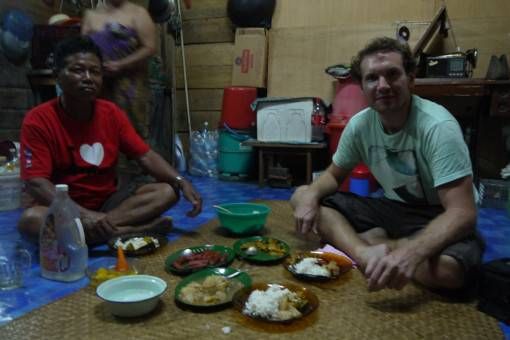
That evening, the Chief and his wife served us a dinner of simple traditional Iban food; fish with pickled cucumber, rice, pumpkin and sausage washed down with a glass of surprisingly strong rice-wine, which the Chief’s wife makes by hand. We were also introduced to Ganya, who, along with two of his friends, would be taking us to the National Park the next day. By way of greeting Ganya broke open a bottle of fire-whisky and challenged Andrew to down several shots. Despite his tiny frame, we quickly realised that Ganya was a pretty keen boozer and the undisputed champion of the drinking contests that take place at the annual harvest festival celebrations.
After a freezing shower we settled down with the other residents in front of the communal TV; supplied by the Malaysian government as part of a programme to ensure rural communities get news from other parts of the country. As coffee was passed around and we tuned into a Malaysian soap I marvelled at how totally different but how strangely similar it all was to life back in England.
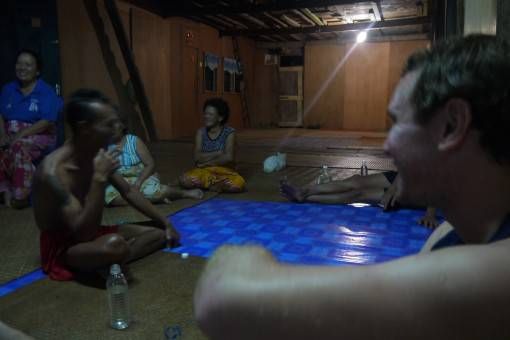
Sleeping Under the Stars in Batang Ai National Park
We awoke to the smell of wood smoke and the crows of roosters early the next morning. Ganya was all business today and we bid farewell to the Chief, boarding the longboat again for the two-hour journey to the National Park. To begin with the boat cut smoothly through the water, then abruptly we rounded a corner and pulled to a stop; the entire width of the river was covered in floating logs and driftwood. We made our way painstakingly through; Ganya’s friends using oars and their feet to create a path as we lurched from side-to-side and Andrew and I gripped the edges of the boat as if our lives depended on it.
At last, with a final gun of the engine we were through and facing the next stretch of river, which was even more difficult to negotiate. We were battered by water as we fought against rapids, the bottom of the boat often scraping the riverbed or knocking into rocks – now we understood why we needed three guides to make the journey.
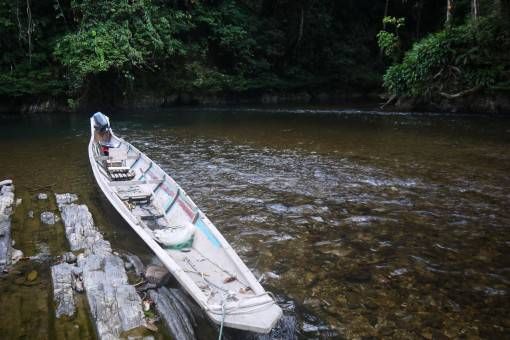
The river eventually evened out and we pulled to a stop outside what looked like several large huts on a hill. This, we thought, must be a ranger’s office where we’d be able to hire a trekking guide and organise accommodation for the night. As we approached, however, we realised that the place was utterly deserted. The buildings were long ago abandoned and had fallen into disrepair; we searched the eerie huts only to find that the jungle had began to claim them back; birds roosted in the ceilings, damp stained the floors and insects crawled over the yellowing posters on the walls.
This wasn’t what we’d expected.
After questioning Ganya we managed to ascertain that tourists hadn’t been coming to the National Park for many years now. There had been a brief period some years ago when the area had thrived; animals – orangutans in particular – had been easy to spot and tourists had flocked to see them. To meet this demand the government had organised buses for tourists to get to the harbour and Ganya and other locals had done a booming trade taking boat loads of tourists back and forth to the National Park where they’d stay in these huts. After several years of this the animals began to move further into the jungle and the tourists had stopped coming – now it would take days to trek into the jungle to find orangutans.
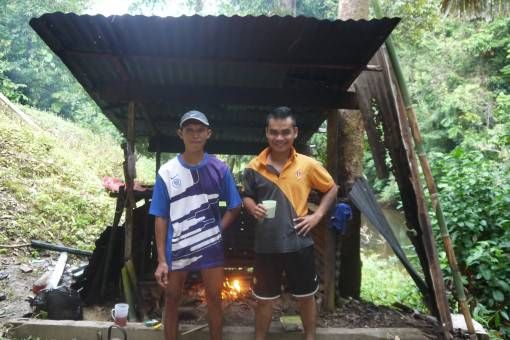
Finally we understood why the journey to Batang Ai had been so long-winded and difficult and why everyone had thought we were crazy for wanting to come here. Our hopes of seeing any orangutans had now completely dispersed but somehow we weren’t that upset – the journey itself and all the help we had so readily received from total strangers; staying in the longhouse and journeying deep into a jungle few tourists visit had turned into a more amazing adventure than we could have ever imagined.
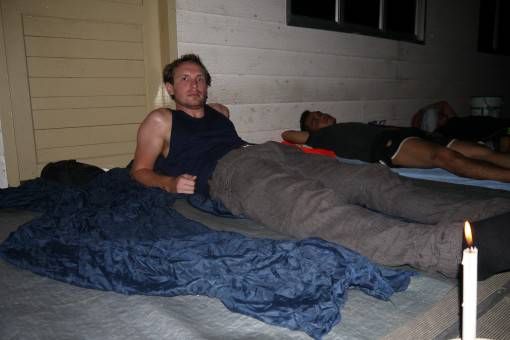
“This will be a very simple night,” said Ganya, pointing to the porch of one of the abandoned buildings where we would be sleeping with no tent, sleeping bags or mosquito nets. We spent the afternoon trekking through the forest with Ganya and watching him fish; we ate rice and barbequed fish and played cards with our guides who now felt like friends.
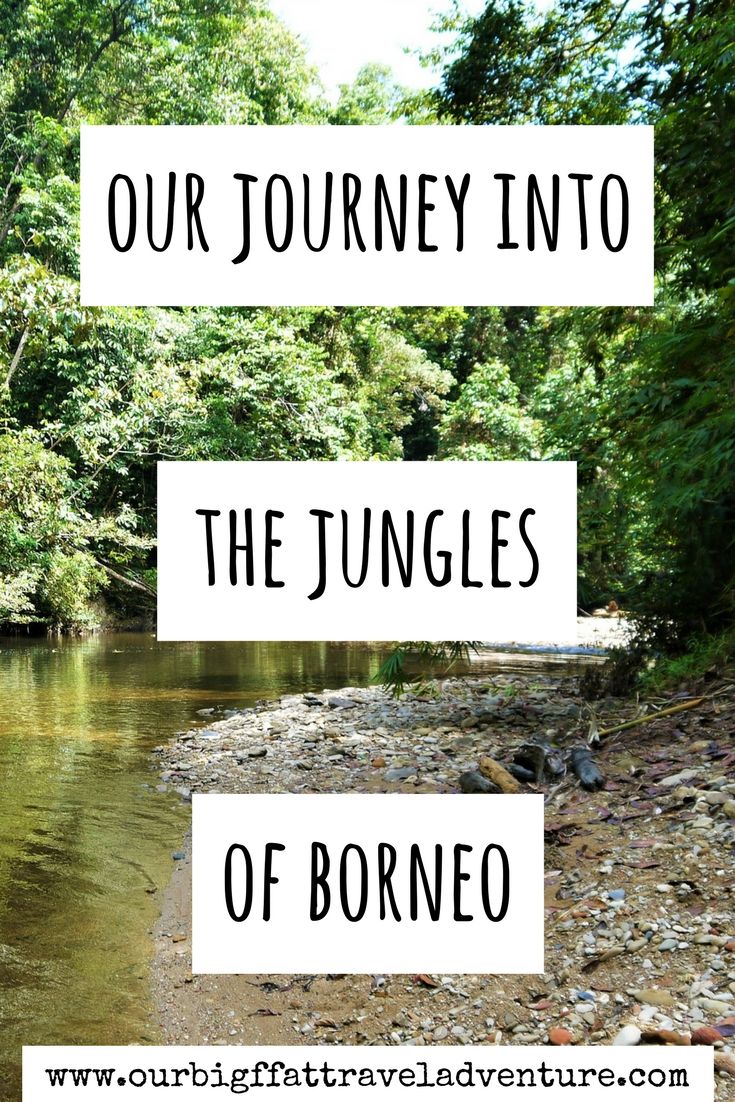
Pin Me For Later!
As the light began to leave the sky we settled down on the hard ground for a sleepless night in the jungle, exhausted, bloody from leech and itchy bug bites but feeling that we’d finally ventured off the beaten track into the unknown.





Rob - Hungry Escapades
Posted at 20:05h, 20 AugustYou are two very determined people indeed! Sounds like a proper adventure, which not many people will get to do. I think it’s great that you realised you didn’t need to see orangutans and that the experience itself was enough. Plus I love how these encounters make you realise how nice complete strangers can be. Heartwarming.
Amy
Posted at 03:26h, 21 AugustWe’re either determined or just stupidly stubborn Rob, but in this case it paid off! One of the things that made this adventure so special was all the people who helped us along the way, I loved it. We didn’t give up on see orangutans either, the quest continued throughout the rest of our time in Borneo.
Madeline
Posted at 02:02h, 21 AugustWow! What an adventure! My husband and I stayed at the Hilton Batang Ai for our honeymoon nearly 10 years ago.
Amy
Posted at 03:23h, 21 AugustYes, it was an incredible adventure Madeline. I bet you had an amazing honeymoon in the swanky Hilton, it looked like a beautiful place to stay.
Shalu Sharma
Posted at 21:35h, 22 AugustThe jungles of Borneo looks interesting. The name of the town Sri Aman is very interesting as its sounds Indian. Staying on the open communal living space must have been an experience.
Amy
Posted at 02:38h, 23 AugustHi Shalu, the jungle was amazing and staying in the longhouse was an incredible experience – the people were so welcoming.
Mig
Posted at 19:26h, 23 AugustGreat story! Good job getting off the beaten path and going with your intuition. Going to a place is not always about getting to the destination, but the journey that unfolds.
Amy
Posted at 03:53h, 24 AugustThanks Mig; that trip really did end up being about the journey rather than the destination!
Heidi Wagoner
Posted at 18:23h, 25 AugustWow guys, this was off the beaten track for sure. I know it didn’t go as planned, but how wonderful to spend time with the family and chief. I bet that was a memory that will last a lifetime.
Amy
Posted at 03:28h, 26 AugustHi Heidi, yes, this was one adventure I’ll never forget!
michael thorpe
Posted at 02:51h, 09 OctoberI lived among the Ibans/Dayaks during the Confrontation days in the 1960’s. I was in the British Army,so my activities were rather curtailed as we were on Active Service.Nevertheless,the experiences and memories are not to be forgotten. Main places I was at include..Tanjong Datu,Sematan.Batu Lintang, Padawan,Tebedu,Sereiki,Plama Mapu and of course Kuching.The wildlife was amazing as were the people.I saw some out of this world things!…..Memories !
Amy
Posted at 13:44h, 10 OctoberHi Michael, thanks for reading and commenting. It sounds like you had an unforgettable experience, thanks for sharing. I would love to revisit Borneo one day.
Christine Chumang Geraman
Posted at 11:21h, 29 AprilGreetings from Batang Ai!! So surprised to see skinny Ganya’s pictures on the internet. Anyway, hi. I’m currently teaching at the primary school near to the longhouse you went to. By the way, the Chief is my father in-law. (while I’m typing this, he makes sure that I stated that he gives his regards to the both of you)
Apart from Ganya’s weight and teeth, a lot has changed in Batang Ai, especially Nanga Delok since 2013. Independent adventurers like you guys helped us in changing this place to be more tourist-friendly. Since your visit, a lot of travelers come over. So, we thought they should have their own place, complete with bed, bathroom and kitchen. But most of the travelers still prefer sleeping at the ‘ruai’ (the long veranda).
Our longhouse with the help of Sarawak Forestry Company are currently working on maintaining the forest. There are more orangutans than before. In fact, you can see them picking fruits on the ground just across the school. It’s always fun to watch random animals across the river. Sitting on the edge of the hill, sipping tea… and suddenly look! There’s a deer… or monkey.
Anyway, please do visit us again!
Amy
Posted at 21:02h, 29 AprilHi Christine, thanks so much for reading and getting in touch! It’s amazing to think that over there in Borneo the Chief has seen my blog post – please send my regards back and tell him we’d love to visit again some time 🙂 It sounds like things have changed a lot since we visited, it’s great to hear that the animals as well as the tourists have started to come back to Batang Ai. Two years on I often still think about the incredible adventure we had in the jungle, it’s one of my favourite travel memories. Please say ‘Hi’ to Ganya for us too, he and the other two guides really made our journey special.
Linz
Posted at 17:04h, 24 OctoberChristine, I would like to visit your longhouse. how can I arrange a trip please? I am living in Miri so I can drive myself in Sarawak. thank you.
Amy
Posted at 12:06h, 29 OctoberHi, we don’t have contacts for visiting the longhouse unfortunately, we were there back in 2013. You can try heading to the dock like we did and asking around though.